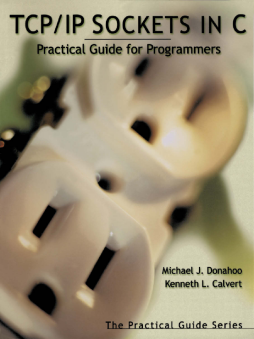
Additional Information
Book Details
Abstract
For example code from the text, Winsock adaptations of text code, sample programming exercises and more,
click on the grey "COMPANION SITE" button to the right.
Note: This title was formerly known as Pocket Guide to TCP/IP Socket Programming in C, ISBN 1-55860-686-6.
TCP/IP Sockets in C: Practical Guide for Programmers is a quick and affordable way to gain the knowledge and skills you need to develop sophisticated and powerful networked-based programs using sockets. Written by two experienced networking instructors, this book provides a series of examples that demonstrate basic sockets techniques for clients and servers.
Using plenty of real-world examples, this book is a complete beginner's guide to socket programming and a springboard to more advanced networking topics, including multimedia protocols.
*Concise, no-nonsense explanations of issues often troublesome for beginners, including message construction and parsing.
*Comprehensive example-based coverage of the most important TCP/IP techniques-including iterative and concurrent servers, timeouts, and asynchronous message processing.
*Includes a detailed, easy-to-use reference to the system calls and auxiliary routines that comprise the sockets interface.
*A companion Web site provides source code for all example programs in both C and WinSock versions, as well as guidance on running the code on various platforms.
"This book fills a void in the area of networking education. The presentation is easily accessible to students, with lots of code examples. It will be an excellent companion to traditional networking textbooks for use in undergraduate and introductory graduate courses." --Ellen W. Zegura, Georgia Institute of Technology
"This is the best, all-in-one socket book I have read and yet it doesn't come with the unnecessary overhead of many other books. It is loaded with very useful examples and it can be used as a socket API reference as well. In a word, it is a very well written book that has everything practitioners need." --Steve Bernier, Communications Research Center
